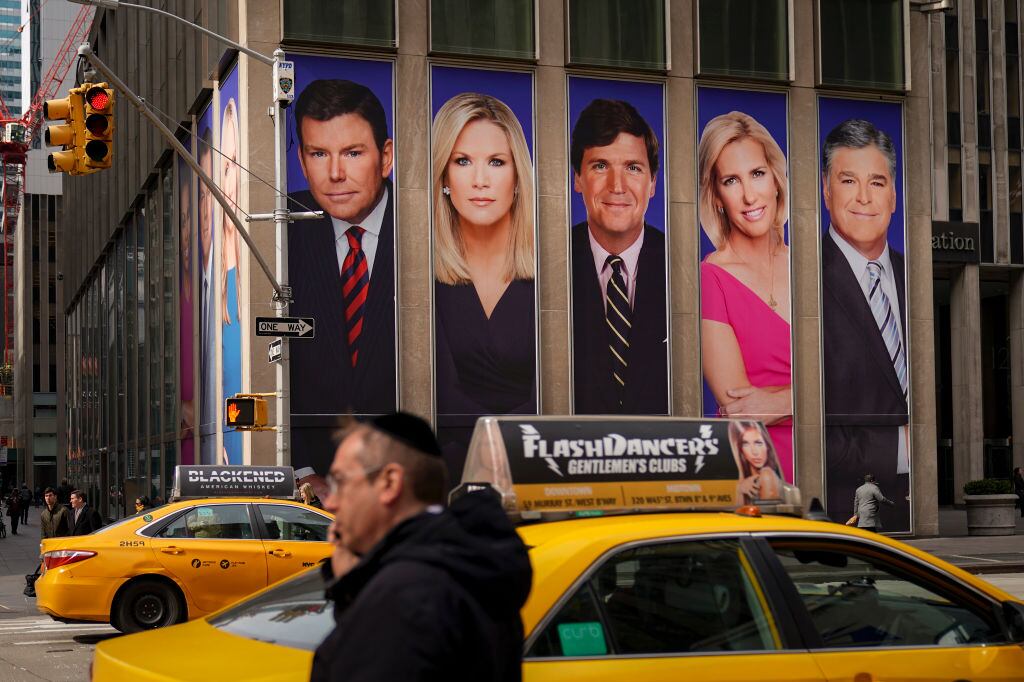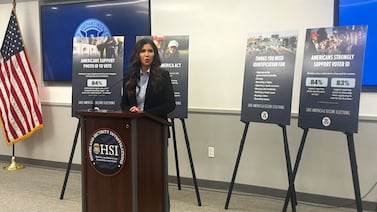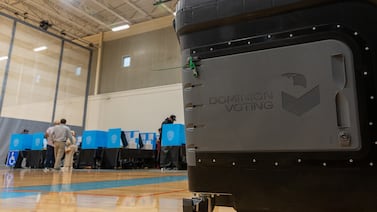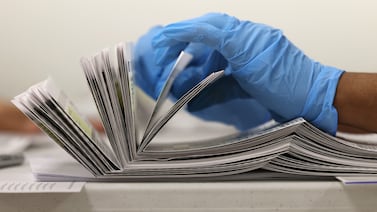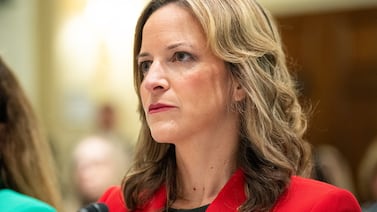Votebeat is a nonprofit news organization reporting on voting access and election administration across the U.S. A version of this post was originally distributed in Votebeat’s weekly newsletter.
After a truly spicy filing this week by Dominion’s attorneys in its ongoing multi-million-dollar defamation lawsuit against Fox News, we know exactly how full-of-it the hosts and executives for that network were while they hurled nonsense about the 2020 election.
It’s a weird thing to know for an absolute fact that the people lying to you knew they were lying to you at the time they did the lying. But there it is, the proof, in black and white. Still, it’s not particularly surprising, is it? Surely it makes more sense that Tucker Carlson and Laura Ingraham simply lied, rather than that they really did believe that stuff. Right?
And it’s not surprising specifically because while these people popped off on cable there was a group of hundreds of people telling us the truth about the election in real time: Local and state election officials. Even under wave after wave of scrutiny, their reassurances about the security and integrity of the 2020 election have been supported by the facts.
They don’t have the powerful reach of Fox News, but they have done some attention-grabbing stuff! Recall, for instance, Wisconsin Election Commission Administrator Meagan Wolfe refusing to step down after politicians baselessly demanded her resignation. Or Gabe Sterling, with the Georgia Secretary of State’s office, who loudly rejected Dominion conspiracies in the state and forcefully told reporters “someone is going to get killed.” Former Philadelphia Commissioner Al Schmidt vouched for the city’s election amid Twitter attacks from Trump and ultimately death threats — now he’s Pennsylvania’s acting secretary of state and received the Presidential Medal of Freedom.
Still, a tower of explicit evidence like Dominion’s filing drives the point home: Lying to viewers gave Fox News the power to outscream the truth coming from officials whose honest message doesn’t carry as far.
It’s startling to think about the amount of money that incentivizes such behavior. Tucker Carlson — who demanded a Trump-debunking reporter be fired because “it’s measurably hurting the company. The stock price is down.” — makes $10 million a year for the pleasure of standing before a camera and lying about the election to his viewers so they keep tuning in. Election administrators, who do not have the luxury of lying to their constituents in return for loyalty, could only dream of such resources.
Tucker Carlson’s annual salary would cover the salary of the Brewster County, Texas election administrator nearly 300 times over. Or, perhaps, the hourly salary of an elections worker in Buncombe County, N.C., for 171 years, accounting for 40 hour work weeks with holidays. While these are typical salary bands for elections administrators, we can also do the math on an administrator in a huge city with lots of experience requirements, just for fun. How about Washington, D.C.? Tucker Carlson’s salary for a year would pay for 83 registrars of voters at the highest end of the offered salary range.
Whatever punishment the court doles out will not come in the form of Fox News giving $10 million to county election officials so that they can work overtime to undo the damage Carlson and his co-workers have done. Perhaps that the court stands to do anything at all should be enough — it is rare that powerful media organizations that exaggerate and lie are held to account at all.
I know that journalists are usually unwilling to speculate about motivation, but in this very unique situation, we don’t have to speculate at all.
Nearly all of the major Fox News personalities who would routinely make absolutely bananas claims about Dominion privately admitted, at the same time, that they knew the claims to be false. Maria Bartiromo, who invited Sydney Powell onto her show to spout off conspiracy theories unchallenged (she rarely challenged anyone on this topic, in fact), privately called Powell’s claims “kooky” in the days after the 2020 election. Sean Hannity loved to say things on the air like “everyone agreed” that Dominion “sucked.” Apparently, everyone did not agree: He privately called Powell a “f**king lunatic” around the same time.
Ah, the legal process of discovery. It even provides us with a “why,” in this case, even if it’s gross: The people who make millions of dollars annually were concerned about ratings dipping as a result of Trump’s loss.
Even the individuals sending the texts in question openly commented on the irony of this public/private incongruence. In the days after Jan. 6, Rupert Murdoch texted Suzanne Scott — the CEO of Fox News, “All very well for Sean to tell you he was in despair about Trump but what did he tell his viewers?” The pair exchanged multiple texts over multiple weeks after the election about how “damaging” and “terrible” the claims from Trump’s team were — and by extension from their network hosts. Murdoch said that if Trump became a “sore loser,” they should make sure their hosts don’t follow suit.
Then, the reality of Fox News calling Arizona for Joe Biden set in. As the filings show, producers and hosts started fervently texting about dropping ratings and lost viewership as a result of the call. Scott openly complained about the damage done to “the brand” of Fox News. Scott, texting with Lachlan Murdoch, another Fox executive, said that Fox’s viewers were going through the “5 stages of grief” and had lost trust in the network. “The AZ [call] was damaging but we will highlight our stars and plant flags letting the viewers know we see them and hear them,” Scott wrote.
And so that motivation won out, even as other Murdoch properties — like the New York Post — ran editorials condemning the stolen election narrative. Dominion’s attorneys point out as much in their whopper of a filing, which asks the judge to rule in their favor immediately given how undisputed the facts are, as a whole. That’s unprecedented in a case like this, but legal experts think they might have the goods to pull it off.
It sounds sanctimonious out of context from the filing, but Dominion’s attorneys write, “Broadcasters make choices about what to air. While that platform comes with tremendous power, it also carries an obligation to tell the truth.”
They have a point, and plenty of journalists, including we at Votebeat, manage to walk that pretty thick line just fine every single day of the week. Telling the truth is much easier than learning the steps to the dance Sean Hannity has been choreographing in real time for the last two and a half years. I am tired just from watching him perform.
And, if journalists need some role models for truth telling, there are literally hundreds of county and state election officials to choose from.
Back Then
As the residents of his Georgia hometown and beyond keep vigil for former President Jimmy Carter, it seems fitting to use this section to recall his careful attention to voting rights during his time in office but also (perhaps even more impactfully) after he left it.
The founding of the Carter Center in 1982 has made observing and promoting democratic processes a priority — essentially pioneering election observation in Africa, Latin America, and Asia. Now, four decades after its founding, the organization has established and is expanding to domestic nonpartisan observation of elections for the first time. The organization has also released extensive study on U.S.-based democracy concerns, including big tech’s impact on misinformation, keeping partisanship out of election administration, and lessons learned from election reform. During President Carter’s final days, it’s important to recognize that the work he began isn’t finished. Other defenders of U.S. democracy will have to carry on the task.
New From Votebeat
From Votebeat Pennsylvania: Unequal election policies disenfranchised some Pennsylvania voters in 2022. Explore what each county did.
From Votebeat Arizona: Election Integrity Unit’s latest pivot has both sides in Arizona questioning whether it should exist at all
From Votebeat Texas: Texas bill would make illegal voting a felony again, even if someone doesn’t know they’re ineligible to vote
In Other Voting News
- Though opposed by Idaho’s secretary of state and several county clerks, a bill to limit eligibility for absentee ballots has cleared committee and is on its way to the House. The author, Rep. Joe Alfieri, said that voting has become too “convenient,” CBS 2 Idaho News reports.
- The Kansas Legislature looks poised to pass legislation removing the three-day grace period voters have after Election Day for their ballot to be received by mail. The success of the measure highlights how strong of a hold conspiracy theory has on the Republican Party in the state, the Associated Press reported.
- Some statewide election officials, including in Minnesota and Michigan, want to make misinformation about elections illegal. They come as a response to federal legislators’ inaction on the problem, the Guardian reports.
- Michigan House Democrats have introduced a bill that would ban guns at polling locations and increase penalties for harassing election workers, Michigan Live reports.
- In the wake of a high-profile congressional race being decided by a whopping six votes, Republicans in Iowa have moved to “tighten and standardize” audit procedures. They’d also like to place additional restrictions on same-day voter registration and absentee voting, reports the Des Moines Register.
- The Chicago Board of Election Commissioners released data on the accessibility of each polling location in the city. An analysis by the Chicago Sun-Times shows that two-thirds of precincts are not fully accessible to voters with disabilities.
Jessica Huseman is Votebeat’s editorial director and is based in Dallas. Contact Jessica at jhuseman@votebeat.org.

